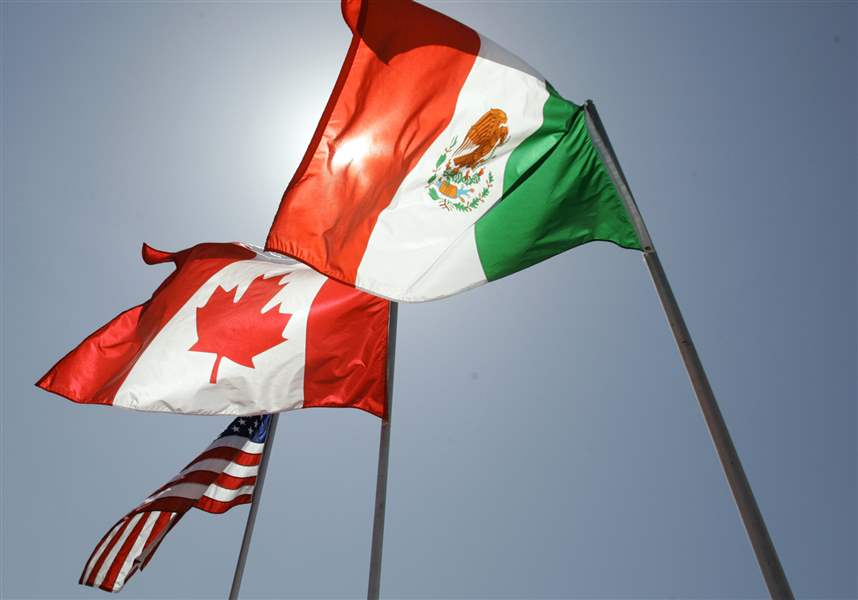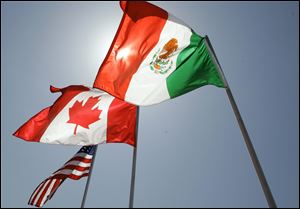
COMMENTARY
NAFTA negotiators must be prepared to get what they wish for
10/12/2017

National flags representing the United States, Canada, and Mexico fly in New Orleans where leaders of the North American Free Trade Agreement met in September.
ASSOCIATED PRESS
DETROIT — Nobody doubts that NAFTA, the North American Free Trade Agreement, needs to be modernized.
“The agreement is 23 years old. The global, North American, and Canadian economies have been transformed in that time by the technology revolution,” said Chrystia Freeland, Canada’s foreign affairs minister, in a major speech in August.
That was at the start of an expected seven rounds of talks scheduled between the United States, Canada, and Mexico before Christmas. Canada’s point of view is that NAFTA, for all its flaws, is more than worthwhile, and that the renegotiations are “an opportunity to make what is already a good agreement even better.” Mexico feels much the same way.

National flags representing the United States, Canada, and Mexico fly in New Orleans where leaders of the North American Free Trade Agreement met in September.
But President Trump has been attacking NAFTA (“the worst deal ever made”) in a series of tweets — and more disturbingly, his administration seems to be making a series of protectionist demands that the U.S. Chamber of Commerce is calling “highly dangerous,” and which may threaten prosperity.
Some even think the talks could collapse and Washington might decide to pull out of NAFTA, something that could have disastrous consequences, especially for this part of the nation.
Douglas George, Canada’s consul general in Detroit, noted in an interview that “of all the states that could be affected by the negotiations over NAFTA, Michigan is at the top of the list,” because it has more trade with Canada than any other state. (Ohio, which is fourth, would also be heavily affected.)
NAFTA, however, is generally unpopular in the United States — and has been since President Bill Clinton got it through Congress in 1994, largely with the aid of Republican votes.
Daniel Ujczo, an attorney in Columbus who specializes in U.S.-Canada matters, agrees the treaty needs to be carefully modified, not scrapped.
Mr. Ujczo has called this a “once-in-a-lifetime opportunity” to modernize NAFTA — and hopes the politicians behind the negotiators understand how delicate trade agreements can be.
The Trump Administration, led by U.S. Trade Representative Robert Lighthizer, began negotiations by aggressively demanding massive changes in things like content requirements for cars and car parts.
That surprised Mr. Ujczo, who was quoted in August as saying “it’s somewhat unorthodox to come out with that level of negative comments about the existing agreement and to lead with our most difficult issue first.”

Lessenberry
He cautioned, however, not to read too much into an early negotiating stance; negotiators have different styles.
But the tough talk continued. Last month, Wilbur Ross, Mr. Trump’s Secretary of Commerce, asserted in a column in the Washington Post that NAFTA was destroying U.S. jobs and benefiting other countries, including those not in NAFTA at all.
The auto industry is a particular target because, Mr. Ross claimed, “The United States would enjoy a trade surplus with its NAFTA partners if it were not for the trade deficit in autos and auto parts.” That alarmed the U.S. Chamber of Commerce, which then asked the Trump Administration to drop attempts to force “extreme” changes in rules of origin requirements.
But the only answer to that was a contemptuous comment from Emily Davis, a spokesman for the U.S. trade representative who virtually sneered that “NAFTA has been a disaster for many Americans, and achieving [President Trump’s] objectives requires substantial change,” she said. “These changes of course will be opposed by entrenched Washington lobbyists and trade associations.”
What happens next is not clear; Canadians say they don’t think the talks are going badly. To be sure, many negotiations begin with sometimes violent posturing — and end with handshakes, smiles, and signed international agreements.
It also is worth remembering that any new treaty would have to be approved by both houses of Congress.
What if the talks fail? President Trump would have the option of pulling out of the treaty entirely with six months’ notice. But that could cause economic and legal havoc.
The short and mid-term damage to the automotive economy could be terrific if things had to be decoupled. Both Consul General George and Mr. Ujczo noted that billions have been spent to develop an efficient supply chain among all three countries. Dismantling it wouldn’t be easy or cheap.
NAFTA has, indeed, had some negative impacts on auto workers, and may have cost some jobs.
But massive international agreements have many ramifications. Perhaps the best advice for those at the NAFTA talks is to make sure they understand what they are wishing for — and to be absolutely certain they are prepared to get it.
Jack Lessenberry, the head of the journalism faculty at Wayne State University in Detroit and The Blade's ombudsman, writes on issues and people in Michigan. Contact him at: omblade@aol.com.